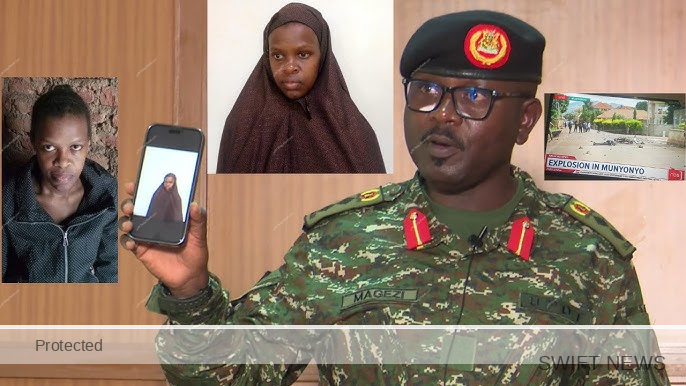
By Our Reporter
Uganda’s security forces narrowly averted what could have been a devastating terrorist attack on Martyrs’ Day, intercepting a suicide bomber just 600 meters from Munyonyo Minor Basilica, a key pilgrimage site. The suspect, Aisha Katushabe, believed to be in her 20s, detonated the explosive device she was carrying after being intercepted by security personnel, dying on the spot.
In a press briefing held at the Ministry of Defence headquarters in Mbuya, Col. Chris Magezi, acting Defence Public Information Officer, revealed chilling new details about Katushabe’s background, affiliations, and family ties to past terror incidents.
A Web Of Terrorism: Family History Uncovered
Katushabe, who also operated under the aliases Byaruhanga Sumayya and Kabonesa, is now known to have deep links to the Allied Democratic Forces (ADF), a terrorist group notorious for its brutal operations in Uganda and the wider Great Lakes region.
Perhaps most shocking is her family’s history of terrorism. Katushabe was married to the late Muzafar, an ADF agent who was killed in 2021 while attempting to bomb mourners at the residence of the late Lt. Gen. Paul Lokech. Even more disturbingly, her father, Abdul Shakur, was the suicide bomber behind the 2021 explosion at Kampala’s Central Police Station (CPS).
“This wasn’t an isolated incident. She comes from a background steeped in extremist ideology,” Col. Magezi stated.
Katushabe had previously been arrested in 2023 over terrorism-related suspicions but was later released due to lack of evidence. This revelation raises tough questions about how suspected extremists are monitored after release.
“This highlights the complexity of counter-terrorism efforts and the challenge of acting without sufficient legal grounds,” said Magezi.
Security forces were able to intercept Katushabe thanks to actionable intelligence obtained from a suspect arrested last week. Authorities had been on high alert following warnings that ADF operatives were planning attacks during the Martyrs’ Day period, which draws thousands of pilgrims to Namugongo and Munyonyo.
Katushabe was traveling on a motorcycle with an unidentified male rider. The motorcycle was registered to a man named Yusuf Musana, but security agencies have not yet established a direct link between him and the suspect.
“Terrorism Knows No Borders”
The Ministry of Defence has pledged to maintain heightened security throughout the Martyrs’ Day season and beyond. “Security remains on high alert and surveillance will continue in and around Namugongo until the last pilgrim departs,” said Magezi.
He emphasized the regional dimension of the threat: “The Great Lakes region remains volatile, and we must stay alert. Terrorism knows no borders.”
The attempted bombing casts a dark shadow over what is typically a peaceful, faith-filled commemoration of Uganda’s martyrs—men and women who died for their religious beliefs in the late 19th century.
Though tragedy was narrowly avoided this time, the shocking personal history of the attacker, and her links to a legacy of violence, serve as a sobering reminder of the ongoing threat posed by radicalized individuals embedded within society.
Authorities continue to investigate the identity of Katushabe’s accomplice and any broader networks that may have facilitated the attempted attack.

